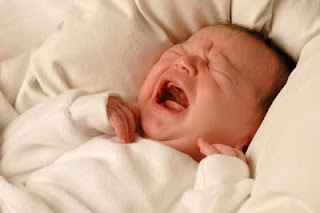Shaking Your Baby to Death
An average baby cries for 2-3 HOURS each day. And 20-30% of babies cry considerably more than that.
“Stop crying! Stop it will you! Oh STOP IT!”
Add to the situation the carer's physical and emotional exhaustion, and also the exhaustion of regular baby-care techniques (feeding, changing, cuddling…you name it) - and many carers have, in desperation, shaken their baby.
Sometimes, this shaking actually seems to work – as the baby might indeed stop crying and become passive, sleepy, subdued after being shaken. So the initial shaking in anger/frustration can even become a “technique” for stopping the baby from crying.
Whether from just one shaking episode (typically even less than 20 seconds) or from several shakings, the damage to the baby’s brain can be devastating. People are literally shaking their babies to death – or to irreversible brain damage.
Shaken Baby Syndrome (which is a subcategory of Abusive Head Trauma) is estimated to be responsible for 300 deaths and 1200 cases of severe brain damage a year in the USA. According to the Israeli National Council for the Child, they estimate 15 babies die each year in Israel; the NCC is therefore currently launching a nationwide awareness campaign to reduce this human catastrophe here in Israel.
According to the The National Center on Shaken Baby Syndrome, the medical effects of shaking babies are: "Approximately 25 percent of all SBS/AHT victims die as a result of their injuries. Of those who survive 80% suffer permanent disability such as severe brain damage, cerebral palsy, mental retardation, behavioral disorders and impaired motor and cognitive skills."
Their practical advice is: “It is important to note that SBS is preventable. Shaking occurs frequently when a frustrated care giver loses control with an inconsolable crying baby. It is important to realize just saying "don't shake a baby" is not enough. A plan of action or suggestions to deal with the situation need to be offered. Parents and other care providers need assurance that allowing a baby to cry is okay if all their needs have been met. The care provider should address their stress level and try stress management.
"Parents should share the message of the dangers of shaking with all who care for their infant or child, including spouses, their own parents, siblings, day care providers and others. Parents need to let those caring for the infant know that it is okay to call for help when needed.”
If you have a baby, or are a carer for someone else’s baby, please review: www.dontshake.org
You can also call the Israeli National Council for the Child helpline (call during regular office hours, it's not 24/7): 02-6780605.
If you are concerned about any changes in your baby’s health, including symptoms which may be Shaken Baby Syndrome – call your Pediatrician or Emergency Response service immediately.
DON’T SHAKE – GET HELP!!!




Comments
Post a Comment